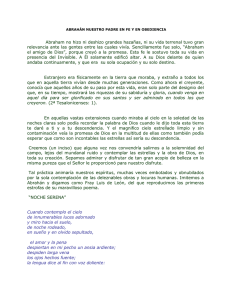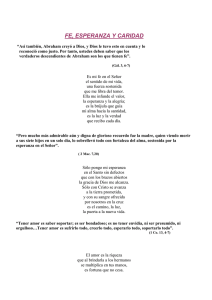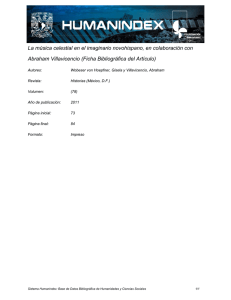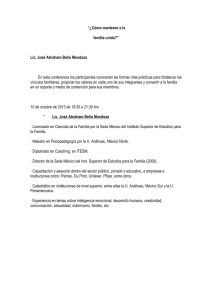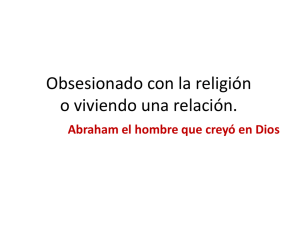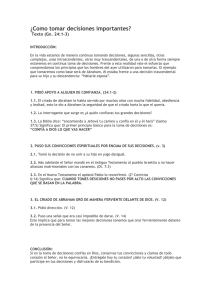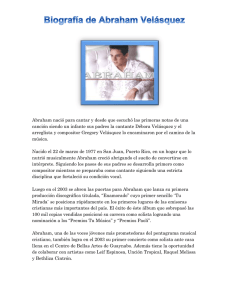Transcripción
Anuncio
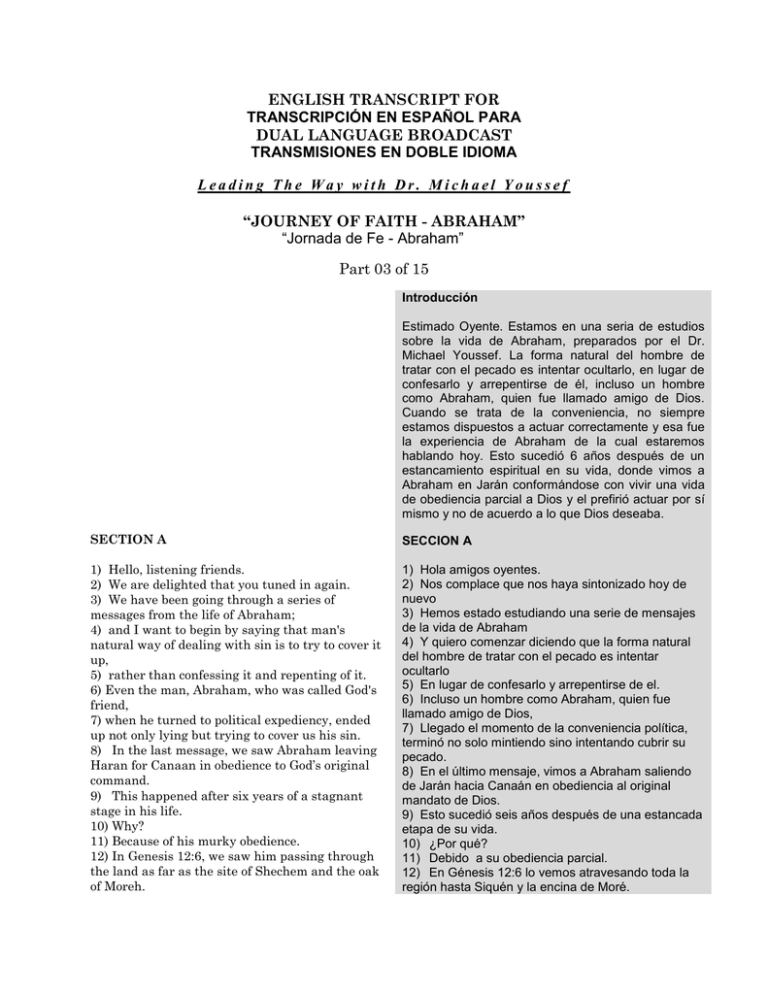
ENGLISH TRANSCRIPT FOR TRANSCRIPCIÓN EN ESPAÑOL PARA DUAL LANGUAGE BROADCAST TRANSMISIONES EN DOBLE IDIOMA Leading The Way with Dr. Michael Youssef “JOURNEY OF FAITH - ABRAHAM” “Jornada de Fe - Abraham” Part 03 of 15 Introducción Estimado Oyente. Estamos en una seria de estudios sobre la vida de Abraham, preparados por el Dr. Michael Youssef. La forma natural del hombre de tratar con el pecado es intentar ocultarlo, en lugar de confesarlo y arrepentirse de él, incluso un hombre como Abraham, quien fue llamado amigo de Dios. Cuando se trata de la conveniencia, no siempre estamos dispuestos a actuar correctamente y esa fue la experiencia de Abraham de la cual estaremos hablando hoy. Esto sucedió 6 años después de un estancamiento espiritual en su vida, donde vimos a Abraham en Jarán conformándose con vivir una vida de obediencia parcial a Dios y el prefirió actuar por sí mismo y no de acuerdo a lo que Dios deseaba. SECTION A SECCION A 1) Hello, listening friends. 2) We are delighted that you tuned in again. 3) We have been going through a series of messages from the life of Abraham; 4) and I want to begin by saying that man's natural way of dealing with sin is to try to cover it up, 5) rather than confessing it and repenting of it. 6) Even the man, Abraham, who was called God's friend, 7) when he turned to political expediency, ended up not only lying but trying to cover us his sin. 8) In the last message, we saw Abraham leaving Haran for Canaan in obedience to God’s original command. 9) This happened after six years of a stagnant stage in his life. 10) Why? 11) Because of his murky obedience. 12) In Genesis 12:6, we saw him passing through the land as far as the site of Shechem and the oak of Moreh. 1) Hola amigos oyentes. 2) Nos complace que nos haya sintonizado hoy de nuevo 3) Hemos estado estudiando una serie de mensajes de la vida de Abraham 4) Y quiero comenzar diciendo que la forma natural del hombre de tratar con el pecado es intentar ocultarlo 5) En lugar de confesarlo y arrepentirse de el. 6) Incluso un hombre como Abraham, quien fue llamado amigo de Dios, 7) Llegado el momento de la conveniencia política, terminó no solo mintiendo sino intentando cubrir su pecado. 8) En el último mensaje, vimos a Abraham saliendo de Jarán hacia Canaán en obediencia al original mandato de Dios. 9) Esto sucedió seis años después de una estancada etapa de su vida. 10) ¿Por qué? 11) Debido a su obediencia parcial. 12) En Génesis 12:6 lo vemos atravesando toda la región hasta Siquén y la encina de Moré. 13) The words “Shechem” and “Moreh” mean “strength” and “instruction” and Abraham needed both. 14) At this point, you may be saying, “Well, at last! Perfect compliance with the will of God!” 15) Yes and no. 16) Abraham gets into Canaan and he gets a surprise. 17) There was a hotel chain slogan that said, 18) "The best surprise is no surprise." 19) Those of us who have traveled, especially overseas, are extremely leery of surprises. 20) I run into them all the time. 21) In some countries, they will sell your hotel room or your plane seat to the highest bidder. 22) Most of us don't like the unexpected and the unpredictable. 23) Most of us don't like what is lurking in the dark. 24) Most of us don't like what we cannot control. 25) When Abraham and company arrived in the land of Canaan, 26) they held a reservation for the land 27) and that reservation had been confirmed by the highest authority possible, 28) God Himself; 29) but, when they got there, 30) at verse 6 in Genesis 12, 31) there was a surprise. 32) "No vacancy" sign is in big letters flashing all over Canaan. 33) The Canaanites were there! 34) God had not said anything about the Canaanites; 35) and, right at that point, Abraham's faith is about to be tested. 36) Please listen carefully. 37) The fact that you are in the center of the will of God does not mean that you will never face problems, 38) or difficulties, or adverse circumstances. 39) The fact that you are at the very center of the will of God does not mean that you will not experience temptations. 40) In fact, that you are at the very center of the will of God does not mean that you will not experience persecution. 41) I looked in vain in all four Gospels. I can not find, even one time, that Jesus promised a bed of roses or a trouble-free life. 42) Now, back to Genesis. Right after verse 6 comes verse 7. 43) While Abraham was scratching his head 13) Las palabras Siquén y Moré significan “fuerza” e “instrucción” y Abraham necesitaba ambas. 14) A este punto usted podría decir, “¡Bien, por fin! Perfecto cumplimiento de la voluntad de Dios” 15) Sí y no. 16) Abraham llegó a Canaán y se llevó una sorpresa. 17) Hubo una vez un lema de una cadena de hoteles que decía, 18) “La mejor sorpresa no es una sorpresa” 19) Todos aquellos de nosotros que hemos viajado sobre todo a otros países, somos extremadamente recelosos con las sorpresas. 20) Yo caía en ellas todo el tiempo. 21) En algunos países, ellos venden su habitación de hotel o el asiento de su avión al mejor postor. 22) A la mayoría de nosotros no nos gustan las expectativas o los impredecibles. 23) A la mayoría de nosotros no nos gusta lo que está acechando en la oscuridad 24) A la mayoría de nosotros no nos gusta lo que no podemos controlar. 25) Cuando Abraham y compañía llegaron a la tierra de Canaán, 26) Ellos tenían una reservación de la tierra 27) Y esa reservación había sido confirmada por la más alta autoridad posible, 28) Dios mismo. 29) Pero cuando ellos llegaron allí, 30) En el verso 6 de Génesis 12, 31) Había una sorpresa: 32) Un aviso de “No hay vacantes” en grandes y luminosas letras en todo Canaán. 33) ¡Los Cananeos estaban allí! 34) Dios no había dicho nada acerca de los cananeos 35) Y justo en ese momento, la fe de Abraham estaba a punto de ser probada. 36) Por favor escuche cuidadosamente 37) El hecho de que usted esté en el centro de la voluntad de Dios no significa que usted nunca enfrentará problemas, 38) Dificultades o circunstancia adversas. 39) El hecho de que usted esté en el mismo centro de la voluntad de Dios no significa que usted no experimentará tentaciones. 40) De hecho, el que usted esté en mero centro de la voluntad de Dios no significa que usted no experimentará persecución. 41) Yo busqué en vano en los cuatro evangelios y no pude encontrar, ni siquiera una vez, en que Jesús prometiera un lecho de rosas o una vida libre de problemas. 42) Ahora, de regreso al Génesis, justo después del verso 6, viene el verso 7. 43) Mientras Abraham está rascándose su cabeza diciendo, “Dios, me dijiste que fuera a Canaán, pero saying, “God, you told me to go to Canaan, but You did not tell me about the Canaanites. 44) God, you command me to come here and leave my family and here I am." 45) In Genesis 12:7, the Bible said, 46) “The Lord appeared to Abram and said, “To your offspring I will give this land. So he built an alter there to the Lord, who had appeared to him.” 47) That is the way God works. 48) He reassures us right at the time when we are baffled and confused. 49) He reassures us right in the midst of our uncertainty and doubt. 50) He reassures us right in the midst of our fear and anxiety. 51) He reassures us right in the midst of our puzzlement. 52) He comes in and affirms His promises. 53) At that point of Abraham’s confusion, God said to him, 54) “To your descendants, I will give this land. 55) Abraham, it is all yours, My friend...” 56) but have you ever felt that even the Lord's assurance is not a real source of comfort? 57) Sometimes, in the midst of your puzzlement, the Lord's assurance does not comfort you? 58) Abraham's puzzlement is now doubled even by God's assurance. 59) God promised Abraham a son. 60) Not only does he not have a son, but Abraham is very old and Sarah is barren; 61) and, now, God tells Abraham that this land of Canaan, which is filled with fierce people, belongs to Abraham. 62) Listening friends, do you see this point? 63) Sometimes, your problem may be too big for you to handle, 64) even when you are trying to appear strong and resilient; 65) but it is not too big for God and, if you are in His perfect will, 66) what God may be waiting for is your repentance and surrender. 67) What God may be waiting for is your willingness to give up relying on your own strength. 68) What God may be waiting for is your willingness to let go of the façade, 69) and Abraham does! 70) So, Abraham pitched his tent and built an altar. 71) When you study the life of Abraham very carefully, you will notice the following: tú no me hablaste de los cananeos.” 44) “Dios, tú me ordenaste venir aquí y dejar a mi familia y aquí estoy” 45) En Génesis 12:7, la Biblia dice 46) “Allí el Señor se le apareció a Abram y le dijo <<Yo le daré esta tierra a tu descendencia>> Entonces Abram erigió un altar al Señor, porque se le había aparecido.” 47) Esta es la forma en la que Dios trabaja. 48) Él nos reafirma justo en el momento cuando estamos desconcertados y confundidos. 49) Él nos reafirma justo en medio de nuestra incertidumbre y duda. 50) Él nos reafirma justo en medio de nuestros temores y ansiedades. 51) Él nos reafirma justo en medio de nuestro laberinto. 52) Él llega y afirma sus promesas 53) A ese punto de confusión de Abraham, Dios le dijo, 54) “A tus descendientes, daré esta tierra.” 55) “Abraham, todo esto es tuyo amigo mío.” 56) Pero ¿alguna vez ha sentido que ni siquiera la seguridad del Señor es una verdadera fuente de consuelo? 57) ¿Algunas veces, en medio de su confusión, la seguridad del Señor no lo conforta? 58) La confusión de Abraham es ahora duplicada incluso por la seguridad del Señor. 59) Dios le promete un hijo a Abraham. 60) No solamente él no tenía un hijo, sino que Abraham era muy viejo y Sara era estéril. 61) Y, ahora, Dios le dice a Abraham que esta tierra de Canaán, la cual está llena de feroces personas le pertenece a Abraham. 62) Amigos oyentes, ¿ven ustedes el punto? 63) Algunas veces su problema puede ser demasiado grande para manejarlo, 64) Aun cuando usted esté tratando de ser fuerte y resistente, 65) Pero no es demasiado grande para Dios y, si usted está en su perfecta voluntad, 66) Lo que Dios puede estar esperando es por su arrepentimiento y rendición. 67) Lo que Dios puede estar esperando es su disposición para renunciar a confiar en sus propias fuerzas. 68) Lo que Dios puede estar esperando es por su disposición a despojarse de su fachada 69) ¡Y Abraham lo hizo! 70) Así que Abraham montó su tienda y construyó un altar. 71) Cuando usted estudia la vida de Abraham cuidadosamente, usted se percatará de lo siguiente: 72) When Abraham is at the center of the will of God, he always pitched a tent and built an altar. 73) Abraham's tent is a symbol of his temporary dwelling. 74) The tent is a symbol that he is not consumed with material possessions. 75) The tent is a symbol of the fact that he is on a pilgrimage. 76) The tent is a symbol of his being vulnerable to the Lord's will. 77) The tent is a symbol that he is ready for the Master's call. 78) You may ask, "Wait a minute, didn't everybody live in a tent in those days?" 79) Not at all. 80) Those who were permanently settled built with rocks and stones, 81) but Abraham's tent indicates the temporary nature of his life. 82) The altar was built of stone, indicating the durability of his fellowship with God. 83) In the Bible, there are three purposes for which an altar is built. 84) First, 85) it is the place of meeting between God and His people. 86) Isaac, Jacob, Moses, Joshua and many others have built an altar for meeting with God. 87) Secondly, 88) it is a place of sacrifice. 89) They sacrifice bulls, goats and lambs on the altars that they built and, later on, Abraham was asked to offer his son as a sacrifice. 90) The third purpose for building an altar is to be the place of prayer. 91) In Revelation 8:3 and 4 tells us that the prayer offered by God's people are symbolized by incense on the altar of God. 92) Let me ask you a question, my listening friend. 93) Do you have an altar? 94) Do you have a place where you meet God on a regular basis? 95) Do you have a place where you offer sacrifice of praise and thanksgiving to the Lord? 96) Do you have a place where you offer intercession before God? 97) Verses 9 to the end of Chapter 12 of the Book of Genesis 98) gives us a clear example of how a man of God can get out of the will of God and start the downhill descent. 99) Verse 9 to the end of Chapter 12 72) Cuando Abraham está en el centro de la voluntad de Dios, el siempre monta su tienda y construye un altar. 73) La tienda de Abraham es un símbolo de su habitación temporal. 74) La tienda es un símbolo de que el no está consumido por las posesiones materiales. 75) La tienda es un símbolo del hecho de que el es un peregrino. 76) La tienda es un símbolo de su ser vulnerable a la voluntad de Dios. 77) La tienda es un símbolo de que está listo al llamado del Maestro. 78) Usted puede preguntar, “Espere un minuto, ¿no todos vivían en tiendas en aquellos días?” 79) No todos. 80) Aquellos que estaban permanentemente establecidos construían con rocas y piedras. 81) Pero la tienda de Abraham indica la naturaleza temporal de su vida. 82) El altar era construido de piedras, indicando la durabilidad de su relación con Dios. 83) En la Biblia existen tres propósitos por el cual un altar ser construía. 84) Primero, 85) Era el lugar de encuentro entre Dios y su pueblo. 86) Isaac, Jacob, Moisés, Josué y muchos otros construyeron un altar para encontrarse con Dios. 87) Segundo, 88) Era el lugar del sacrificio. 89) Ellos sacrificaban toros, cabras y corderos sobre el altar que ellos construían, y más adelante, a Abraham le fue pedido que ofreciera a su hijo en sacrificio. 90) El tercer propósito para construir un altar es para que fuera un lugar de oración. 91) En Apocalipsis 8:3 y 4, se nos dice que las oraciones ofrecidas por el pueblo de Dios son simbolizadas por el incienso sobre el altar de Dios. 92) Permítame hacer una pregunta, amigo oyente. 93) ¿tiene usted un altar? 94) ¿tiene usted un lugar donde se encuentra con Dios regularmente? 95) ¿tiene usted un lugar donde ofrece sacrificios de alabanza y acciones de gracias al Señor? 96) ¿Tiene usted un lugar donde ofrece intercesión ante Dios? 97) Desde el verso nueve hasta el final del capítulo 12 del libro de Génesis 98) Nos da un claro ejemplo de cómo un hombre de Dios puede salirse de la voluntad de Dios y comenzar su descenso cuesta abajo. 99) El verso 9 hasta el final del capítulo 12. SECTION B SECCION B 1) Someone said the following: 2) “Biblical truth is like the pinnacle of a steep, slippery mountain 3) one step away and you find yourself on the down-grade.” 4) I believe this with all my heart. 5) I believe it is true for individual Christians 6) and I believe it is true for churches. 7) Abraham only took one step away from the will of God and the rest is history. 8) Abraham did not go to Egypt right away. 9) No. 10) He went into the Negev first. 11) The Negev was only half-way to Egypt. 12) He probably thought to himself, “I can always get back to Canaan,” 13) but it wasn't long before he turned his back on his altar 14) and folded his tent 15) and packed his bags 16) and left the place which God had chosen for him. 17) In verse 10 it says, “. . .there was famine in the land . . .." 18) Abraham was hungry. 19) After all, a man needs to eat. 20) Please listen to me carefully. 21) God did not tell Abraham to go to Canaan so that he could die. 22) “I will give you the land to you and your descendants.” 23) In other words, Abraham's food and Abraham's welfare are God's problem. 24) Please listen carefully. 25) Egypt in the Scripture is the place to go to when you are running away from the will of God. 26) Egypt was the symbol of the flesh. 27) Egypt was a symbol that when you stop trusting in God and you trust in man. 28) Egypt was a symbol of leaning upon your worldly wisdom, instead of the Lord's wisdom. 29) Egypt was a symbol of the chains and shackles of Satan and his bondage; 30) so, for Abraham, going to Egypt symbolized moving out of the will of God and into "do it yourself" kind of obedience. 31) What happens when you get out of the will of God? 32) You will find that continuing in sin becomes easy. 33) I will tell you something else that accompanies 1) Alguien dijo lo siguiente: 2) “La verdad bíblica es como el pináculo de una empinada y resbaladiza montaña – 3) Un paso en falso y usted se encontrará cuesta abajo” 4) Yo creo esto con todo mi corazón. 5) Yo creo que esto es verdad para cada cristiano 6) Y yo creo que eso es verdad para la iglesia. 7) Abraham solo dio un paso fuera de la voluntad de Dios y el resto es historia. 8) Abraham no fue a Egipto directamente. 9) No. 10) Él fue primero al Néguev 11) El Néguev estaba solo a medio camino de Egipto. 12) El probablemente pensó, “Yo puedo siempre regresar a Canaán,” 13) Pero no había pasado mucho tiempo de haberle dado la espalda a su altar 14) Y recogió su tienda 15) Y empacó sus maletas 16) Y dejó el lugar que Dios había escogido para el. 17) En el verso 10 dice, “…hubo tanta hambre en aquella región…” 18) Abraham tenía hambre 19) Después de todo, un hombre necesita comer. 20) Por favor escuche cuidadosamente. 21) Dios no le dijo a Abraham que fuera a Canaán para que muriera 22) “Yo te daré la tierra a ti y a tu descendencia.” 23) En otras palabras, la comida de Abraham y el bienestar de Abraham eran problema de Dios. 24) Por favor ponga mucha atención. 25) Egipto en las escrituras es el lugar para ir cuando usted está huyendo de la voluntad de Dios. 26) Egipto era el símbolo de la carne. 27) Egipto era un símbolo de cuando usted deja de confiar en Dios y usted confía en el hombre. 28) Egipto era el símbolo del aprendizaje de la sabiduría mundana en lugar de la sabiduría de Dios. 29) Egipto era el símbolo de las cadenas y ataduras de Satanás y sus cargas. 30) De modo que Abraham, al ir Egipto simbolizó la salida de la voluntad de Dios y entrar a una especie de obediencia de “hazlo por ti mismo”. 31) ¿Qué pasa cuando usted se pone fuera de la voluntad de Dios? 32) Usted encontrará que el continuar pecando se convierte en algo fácil. 33) Yo le diré algo más de lo que acompaña el ponerse fuera de la voluntad de Dios – getting out of the will of God 34) Fear. 35) When Abraham was in the will of God, 36) he came to Canaan and saw those mean and fierce Canaanites; 37) but that didn't frazzle him one bit, 38) but he built an altar and pitched his tent; 39) but, now, that he is out of the will of God, 40) he was fearful. 41) All he could think of was his own safety. 42) Well, in those days, it was the prerogative of Pharaoh to take any woman he wanted into his house. 43) If the woman is married, the ruler would order the death of her husband so he could keep her to himself; 44) and Abraham did not like this part about killing of the husband. 45) Sarah must have been a beautiful woman, 46) even at the age of 65, 47) and Abraham knew that; 48) so, he asked her to join him in the big lie. 49) “Say that you are my sister. . .” 50) which is half-truth because she was his halfsister. 51) My listening friend, please listen to me very carefully. 52) It is all the intention of the heart 53) and the intention of the heart of Abraham was to deceive for self-protection. 54) Some 1,800 years after Abraham, 55) a husband and wife named Ananias and Sapphira agreed to lie to the Apostles, 56) and they were stuck dead on the spot. 57) Well, the immediate fruit of sin may not be visible 58) and the Bible says that sin is pleasurable for a season. 59) Immediately, Abraham was rewarded with wealth and cattle and Pharaoh lavished gifts upon him; 60) but, when God intervened, no doubt Abraham reaped shame and embarrassment. 61) Despite Abraham's lack of trust, God preserved him anyway. 62) In verse 17, it tells us that a great plague fell on Pharaoh's household. 63) Sarah's honor was preserved 64) despite of the selfish action of her husband. 65) In Egypt, Abraham sank to the bottom of the quick-sand pit 66) and he was rebuked by a pagan Pharaoh! 34) Temor. 35) Cuando Abraham estaba dentro de la voluntad de Dios, 36) El vino a Canaán y vio aquellos grandes y fieros cananeos, 37) Pero eso no lo atemorizó ni un poquito, 38) Sino que el construyó un altar y montó su tienda. 39) Pero ahora que él estaba fuera de la voluntad de Dios, 40) Él estaba temeroso. 41) Todo en lo que podía pensar era en su propia seguridad 42) Bien, en aquellos días era prerrogativa del faraón el tomar cualquier mujer que el quisiera para su casa. 43) Si la mujer estaba casada, la norma ordenaba la muerte del esposo de modo que el pudiera tomarla para sí mismo. 44) Y Abraham no le gustó esa parte de matar al marido. 45) Sara debió haber sido una hermosa mujer, 46) Aun a los 65 años de edad, 47) Y Abraham sabía eso. 48) De modo que él le pidió a ella que se le uniera en una gran mentira. 49) “Di que eres mi hermana…” 50) Lo cual era media verdad porque ella era su media hermana 51) Mi amigo oyente, por favor escúcheme muy cuidadosamente. 52) Todo es la intención del corazón 53) Y la intención de corazón de Abraham era engañar para auto protegerse. 54) Algunos 1800 años después de Abraham, 55) Una pareja de esposos llamados Ananías y Safira acordaron engañar a los apóstoles, 56) Y ellos cayeron muertos en el momento. 57) Bien, el fruto inmediato del pecado puede que no sea visible 58) Y la Biblia dice que el pecado es placentero por un momento. 59) Inmediatamente, Abraham fue recompensado con riquezas y ganado y faraón le dio esplendidos regalos; 60) Pero cuando Dios intervino, sin duda Abraham cosechó vergüenza y apuros. 61) A pesar de la falta de confianza de Abraham, Dios lo preservó de todas formas. 62) En el versículo 17, nos dice que una gran plaga cayó sobre la casa de faraón. 63) El honor de Sara fue preservado 64) A pesar de la acción egoísta de su esposo. 65) En Egipto, Abraham se hundió hasta el fondo del pozo de las arenas movedizas. 66) Y él fue rechazado por un pagano faraón. 67) Talk about life's most embarrassing moment, this was one of them. 68) The friend of God is being rebuked by a pagan. 69) What did this say about Abraham's testimony? 70) Listening friend, 71) Christians who are the most vulnerable to sin are those who think that, because they have been justified in the sight of God, can live any way they want. 72) They think that, because they are righteous in the sight of God, they don’t need to guard against sin. 73) Some of you are more dependent on your religious affiliation than the gospel of genuine repentance. 74) Some of you are more tied into the gospel of religious ritual than the Gospel of surrender. 75) Some of you are more concerned about your image in the community than purity of life 76) and what God is saying to us today through the failure of Abraham is this: 77) "Put your whole trust in Me and I will direct your path. 78) You don't need to run into Egypt. 79) For whoever wants to save his life will lose it, 80) but whoever loses his life for Me will find it.” 81) It is my prayer that you would say “yes” to Jesus, 82) and, until we meet again, I wish you God’s richest blessing. 67) Hablando acerca de los momentos más embarazosos de la vida, este era uno de ellos. 68) El amigo de Dios está siendo rechazado por un pagano. 69) ¿Qué dice esto acerca del testimonio de Abraham? 70) Amigo oyente, 71) Los cristianos que son más vulnerables a pecar son aquellos que piensan que porque ellos han sido justificados ante los ojos de Dios pueden vivir en la forma que quieran. 72) Ellos piensan que porque están justificados ante los ojos de Dios ellos no necesitan protegerse en contra del pecado. 73) Algunos de ustedes son más dependientes de sus afiliaciones religiosas que del genuino arrepentimiento del evangelio. 74) Algunos de usted están más atados a los rituales religiosos que al evangelio de rendición. 75) Algunos de ustedes están más preocupados por su imagen en la comunidad que por la pureza de su vida 76) Y lo que Dios está diciéndonos hoy a través del error de Abraham es esto: 77) Pon toda tu confianza en Mí y yo dirigiré tus pasos. 78) Usted no necesita escapar a Egipto. 79) “porque todo aquel que quiera salvar su vida, la perderá,” 80) “pero todo aquel que pierda su vida por mí, la hallará.” 81) Es mi oración que usted pueda decir “Si” a Jesús, 82) Y hasta nuestro próximo encuentro yo deseo que Dios le bendiga ricamente.

